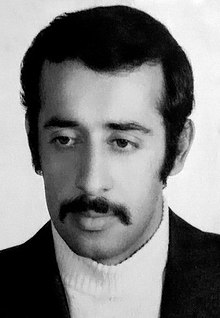Mohammad Javad Tondguyan
Mohammad Javad Tondguyan | |
|---|---|
 | |
| Minister of Petroleum | |
| In office 25 September 1980 – 17 August 1981[Note 1] | |
| Prime Minister | Mohammad Ali Rajai |
| Preceded by | Ali Akbar Moinfar |
| Succeeded by | Mohammad Gharazi |
| Personal details | |
| Born | 16 June 1950 Tehran, Iran |
| Died | 16 December 1991 (aged 41)[Note 2] Iraq |
| Resting place | Hafte Tir Mausoleum |
| Nationality | Iranian |
| Political party | Independent |
| Spouse(s) | Batoul Borhan Ashkevari |
| Children | 4 |
| Alma mater | Petroleum University of Technology (B.Sc.) Iran Center for Management Studies (M.Sc.) |
Mohammad Javad Bagher Tondguyan (Persian: محمدجواد تندگویان; 16 June 1950 – 16 December 1991) was an Iranian engineer and petroleum minister under Prime Minister Mohammad-Ali Rajai from 2 September to 3 November 1980 when he was captured by the Iraqi forces in November 1980 during Iran-Iraq war.
Early life and education[]
Tondguyan was born on 16 June 1950.[1]
He was involved in opposition movement against Shah Mohammad Reza Pahlavi in 1967 and was detained and interrogated by the SAVAK.[1] During this period he met Mohammad Khatami.[1] From 1968 to 1972 Tondguyan studied oil engineering at the Abadan Technologic Institute, now Petroleum University of Technology, where he was head of the Islamic Association.[2] The association hosted Ali Shariati, one of the philosophical and political leaders of the Islamic revolution, as a speaker during the 1960s and 1970s.[2] Tondguyan was also one of the figures who disseminated the views of Ayatollah Ruhollah Khomeini in Abadan during this period.[2]
Career[]
Following his graduation, Tondguyan began to work in the Tehran refinery.[2] Then he worked for various oil companies in Iran until the 1979 revolution.[1] After the revolution, he was appointed deputy science minister.[1]
In September 1980, Tondguyan was named oil minister replacing Ali Akbar Moinfar in the post and served in the cabinet of Mohammad Ali Rajai.[1] His successor as the minister of oil was Mohammad Gharazi.[3]
Captivity and death[]
Tondguyan was captured by the Iraqi forces on his tour to the fronts on the Abadan road in Khuzestan Province on 3 November 1980 at the initial phase of the Iran-Iraq war which lasted from 1980 to 1988.[4][5][6] His deputy and a ministry official were also captured with him.[7] They were reportedly taken to Baghdad.[8]
In October 1990, the Iraqi officials stated that he committed suicide two years after his captivity.[5] In November 1990, his wife and father denied this report.[4] Tondguyan's body was delivered by the International Committee of the Red Cross (ICRC) to the Iran government in 1991.[6] ICRC reported that he died of torture after eleven years of detention in Iraqi prisons.[6]
Personal life[]
Tondguyan was married and had four children.[4]
Notes[]
References[]
- ^ a b c d e f "Joint Crisis: Supreme Defense Council of Iran, 1980" (PDF). Harvard Model United Nations. Archived from the original (PDF) on 5 October 2013. Retrieved 14 February 2013.
- ^ a b c d Peyman Jafari (2019). "Linkages of oil and politics: oil strikes and dual power in the Iranian revolution". Labor History. 60 (1): 27–28. doi:10.1080/0023656X.2019.1537018. hdl:11245.1/cf873983-78d2-4054-aef3-00ffa6a7a6c3.
- ^ Nader Habibi (June 2014). "Can Rouhani Revitalize Iran's Oil and Gas Industry?". Middle East Brief (80): 4.
- ^ a b c "Former Oil Minister's Family Appeals for His Release" (PDF). Kayhan. 5 November 1991. Retrieved 14 February 2013.
- ^ a b "Iraq Claims Captive Iranian Ex-Oil Minister Committed Suicide". Nicosia. Associated Press. 23 October 1990. Retrieved 14 February 2013.
- ^ a b c "Former minister family seeks compensation from Iraqi national authority". Asia Africa Intelligence Wire. Tehran. BBC. 25 December 2003. Retrieved 14 February 2013.
- ^ Randy Shipp (6 November 1980). "Red Cross asks for report on Iran official's capture". The Christian Science Monitor. Geneva. Retrieved 26 July 2013.
- ^ David Balderstone (4 November 1980). "Free minister, says Iran". The Age. Tehran. Retrieved 16 February 2013.
External links[]
 Media related to Mohammad-Javad Tondguyan at Wikimedia Commons
Media related to Mohammad-Javad Tondguyan at Wikimedia Commons
- 20th-century Iranian engineers
- 20th-century Iranian politicians
- 1950 births
- 1991 deaths
- Iran–Iraq War prisoners of war
- Iranian prisoners of war
- Iranian torture victims
- National Iranian Oil Company people
- Oil ministers of Iran
- Petroleum engineers
- Prisoners of war held by Iraq
- Petroleum University of Technology alumni